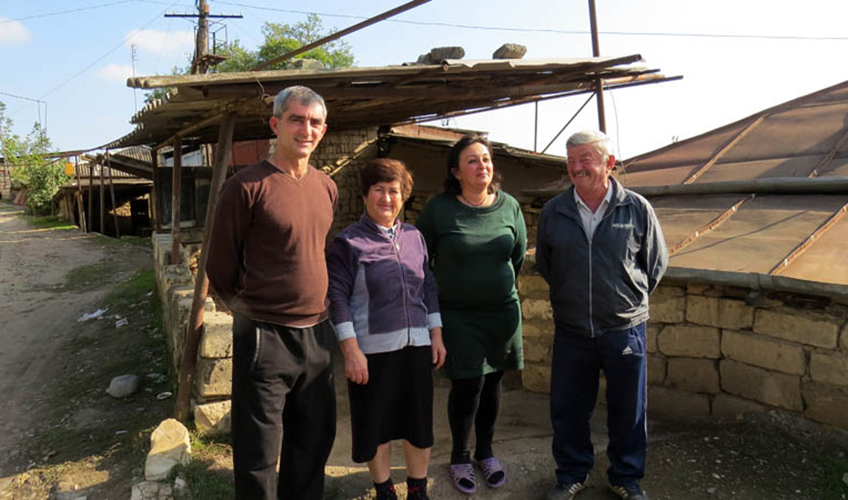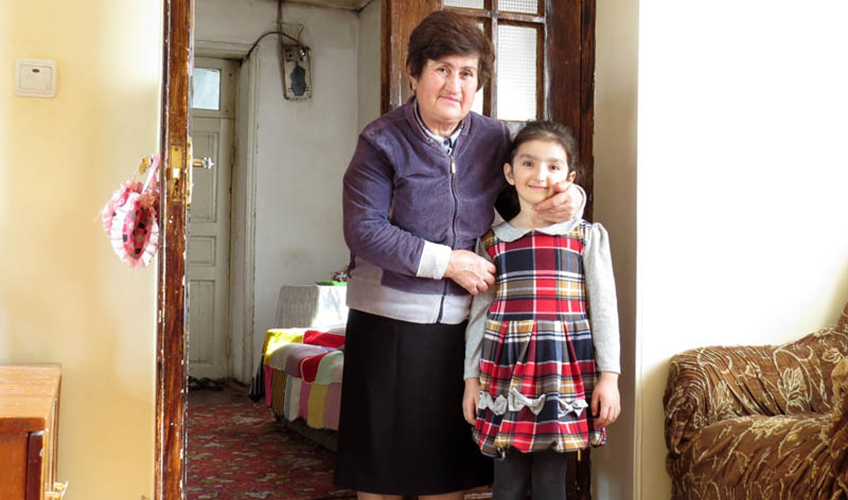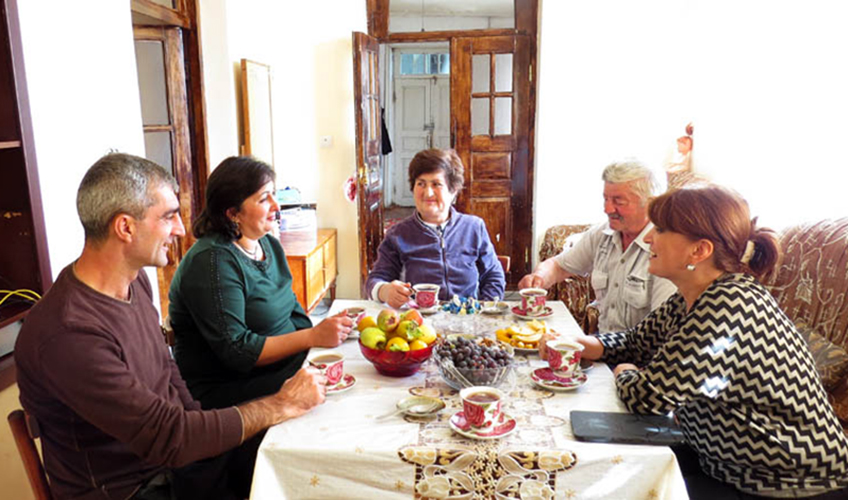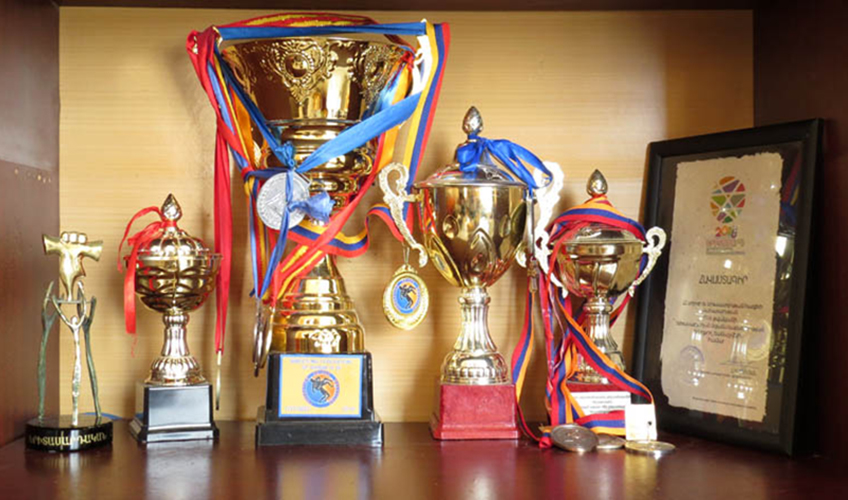Becoming a family of refugees
Albert Voskanyan, a journalist from Nargorny Karabakh, meets a family who were forced to relocate from Azerbaijan as a result of the Karabakh conflict.

We drove up to the home of Abrik and Aida Agasyan in Martuni, Nagorny Karabakh. The Agasyan family home is in an area called Rusin Takhy which literally translates as ‘the place of Russians’. Aida was there to give us a warm welcome, she smiled and invited us in to meet her son Grigory and daughter-in-law Rita. Then her husband Abrik arrived, a short grey-haired man about 70 years old. I introduced myself and explained why I was there. I felt Abrik was a little cold. But I thought, “it’s okay, I don’t want to rush things, he’ll probably come around later.” It turns out I was right.
Refugee and internally displaced persons (IDPs) – categories of people that appear in all conflicts and unfortunately there’s no escaping that. A person can live their life, build a home, start a family, have children – everything may seem to be going well. But at some point everything falls apart and they are forced to leave the place they call home and move somewhere new. In any new place you’ve got to get used to your surroundings and integrate into a new community. But let’s return to the Agasyan family.

Aida, born in the village of Mushkapat, Martuni district, had just turned 18 when she got married to fellow countryman Abrik. He was born in the village of Haghorti but moved and was living in Baku, Azerbaijan. The young couple got a flat and lived in the village of Akhmedly, Azerbaijan. Abrik worked in a Baku fridge factory and she was a housewife.
They had two sons, Grigory and Vladimir, and life was good. The children were growing up, going to school and Aida started working as a passport officer in the Narimanovskiy district. Grigory took up freestyle wrestling and started taking part in competitions and even won prizes. Years went by quietly but then Sumgait happened. The tragic events that happened in that town turned Armenian lives upside down and convinced many to leave Baku.
The Agasyan family were no exception: in November 1988 they left by plane to Yerevan. But before they could leave they were kept under guard at Baku airport for three days, along with many other Armenians. Living conditions were tough. In the end their neighbour Kyamal, who was a policeman, helped them get tickets and they were able to fly out. To this day they warmly recall how he helped them.
I asked Aida to talk a bit about life in Baku and Martuni, about the war and life after the war.
“We didn’t live badly in Baku. Our neighbours were all of different nationalities: Armenians, Azeris, Russians, Legzins, Tatars and others. At no time did any of them get into conflict with each other. Our area was generally working class, and what does a working man need but to make enough for some bread to feed his family? But after Sumgait, it wasn’t that relations got worse as such, but there was definitely a lot of tension. A district police officer lived on the ground floor of our building – when people got anxious in Baku he said that we shouldn’t leave because things would soon go back to normal. No one attacked our home and we didn’t receive any threats, but deep down we felt that things had been thrown upside down and decided to leave. What was never really in question was where we should go – to Nagorny Karabakh, Martuni, where my husband and I both had roots. Jumping ahead a little, I’ll say that after we moved in 1989 we went back to Baku to resolve legal issues that had to do with our flat. We were able to take the rest of our things including our car, a Moskvitch-2140. When we were packing our things none of the neighbours came out to help. But it has to be said that they didn’t interfere either. One or two of them did come up and ask if maybe we’d reconsider staying.
“We exchanged our Baku home for the one we’re living in now. The owner was an Azeri called Knyaz. We filled in all the official forms and officially completed the transfer. We were able to bring over all our things to Martuni, and Knyaz did the same moving his things out. He took everything with him to Baku.”

Life after the war
In Baku Grisha had taken up freestyle wrestling at the Spartak sports club and was always travelling to take part in competitions where he’d win prizes. He also completed his Masters in Sport. After the war he trained children for a number of years in Martuni and was in charge of the freestyle wrestling group. He then moved with his family to live in Russia permanently, but came back to Martuni about three years later.

I found Grisha’s life in Baku, his friends, schoolmates and his attitude to the war very interesting.
“It’s hard to tell you definitively about my attitude to the war. My opinion was this: sooner or later this conflict was bound to happen. The preconditions were already there and the tragedy at Sumgait was only the spark. I moved to Karabakh which was the right thing, it being the land of my ancestors, but there were problems. The locals all knew each other very well, who was whose grandchild and who was from which family. But for them we were refugees. But that’s not right. We’re as much from Karabakh as anyone and we’re Armenians, it’s just not right to divide us like that. During the war a lot of our guys died – which is very bad,” said Grisha.
“I had to fight but I never imagined that my son would have to see the same thing that I lived through. Artur, my son, was called up for active duty in July 2015. On 1 April 2016, when the four-day war began, he was with his friends in Talish. During the offensive their post repelled enemy attacks, for which he and his friends were awarded medals and he was awarded the higher rank of lieutenant. My second son Abrik is currently in the defensive army. My third son, Arsen, is in his fourth year at the Olympic Reserve School in Armenia. At first he was a wrestler but he’s now moved to more classic Greco-Roman fighting, and according to his trainers, he has a lot of potential.”
“What can I say about life in Baku and my friends? I was training to be a tailor, and at the same time managed to work at the Volodarskiy Baku clothing factory. Work was only part-time but the money I earned was ok. After leaving I went back to Baku to pick up my diploma and found out my classmate had been picking up my stipend for me, so he was able to give it all to me when we saw each other. Before leaving I sat down with my mates, and then they saw me off,” said Grisha.
Grisha and Rita’s daughter Milena, now in her third year, arrived home from school. Her parents told me that she goes to a music school, so I asked her to sing me a song. Rita of course put her daughter into the national costume who, without hesitation, sang a song in Russian.
As we were leaving, the Agasyan family all come outside and warmly said their goodbyes. It struck me that Abrik wasn’t frowning anymore and, with a big smile, shook my hand to say farewell.
Read more stories from other journalists in the region
- Gayane Mirzoyan, Armenia
- Samira Ahmedbeyli, Azerbaijan
About the project
Albert Voskanyan, from Nargorny Karabakh, is one of the journalists taking part in this project and wrote the above story.
Unheard Voices is part of International Alert’s work on the Nagorny Karabakh conflict. The project brings together journalists from across Armenia, Azerbaijan and Nagorny Karabakh to report on stories of ordinary people who have suffered as a result of the conflict, whose voices are not usually heard. The purpose is to ensure their voices are heard both at home in their own societies and on the other side of the conflict divide, allowing readers to see the real faces hidden behind the images of ‘the enemy’. To view materials from all sides, challenging stereotypes and isolation.
This project is funded by the European Union as part of the European Partnership for the Peaceful Settlement of the Conflict over Nagorny Karabakh (EPNK).
The materials published on this page are the views of the journalist and do not necessarily reflect the opinions or policies of International Alert or our donors.






